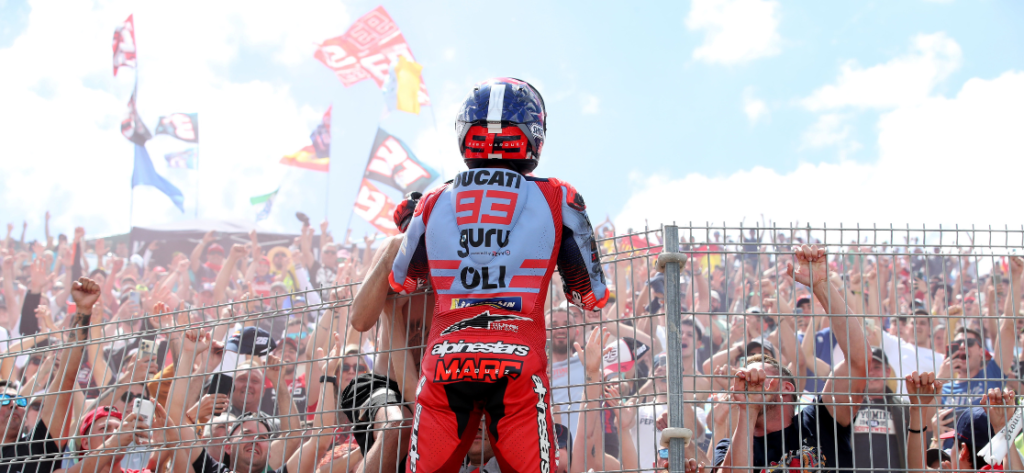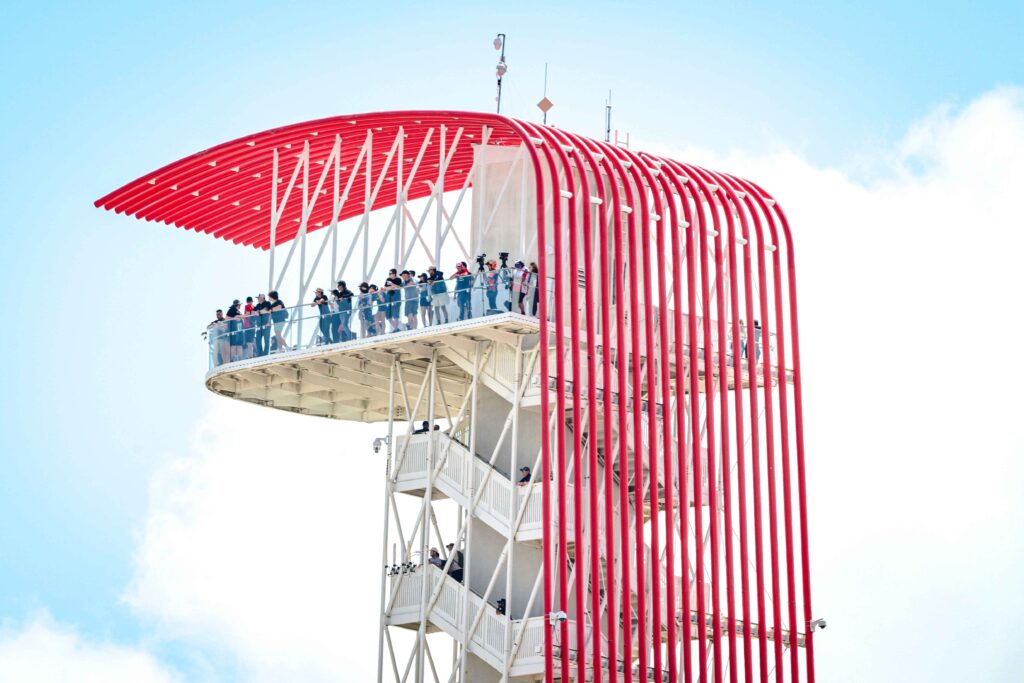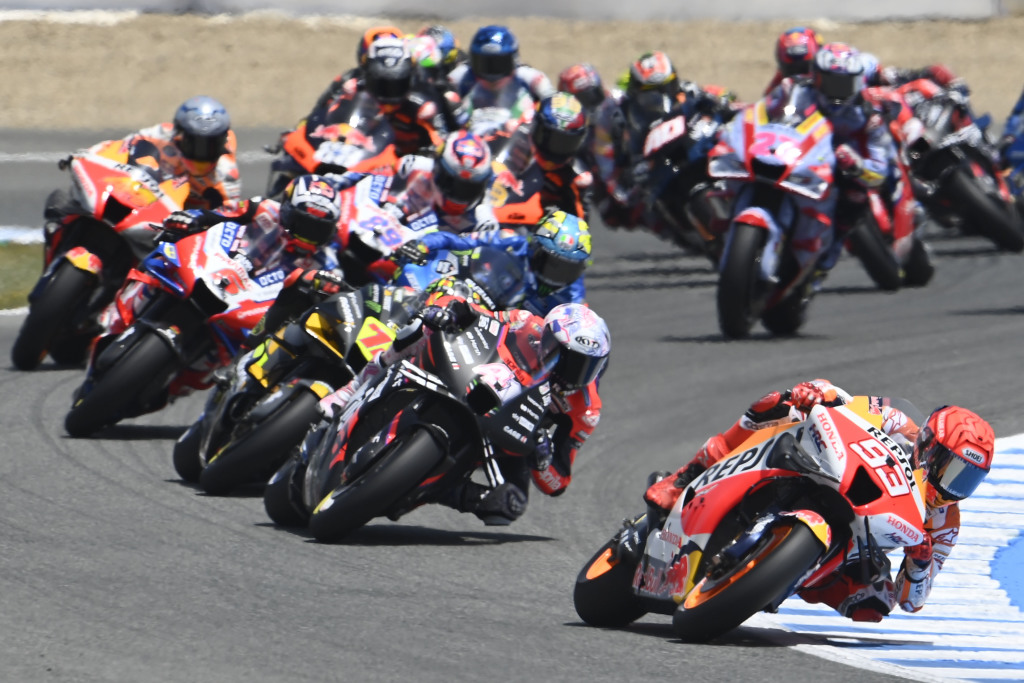The Spaniard secured the 2025 MotoGP world title – his first in several years – capping a comeback that underlines both his resilience and enduring brilliance.
The victory draws him level with Valentino Rossi on seven premier-class championships, a milestone that further cements his legacy among the sport’s greatest. A pre-season favourite, Marc Márquez delivered when it mattered most, combining experience, precision, and trademark aggression to outclass a fiercely competitive field.
Here’s how Marc Márquez made history in 2025 to become a seven-time MotoGP champion.

From Buriram to Qatar: Márquez’s early season charge
From the moment the lights went out in Thailand, Marc Márquez made it clear that 2025 would be on his terms. At Buriram, he was untouchable – winning both the sprint and the main race on his Ducati Desmosedici GP to complete a perfect opening weekend. Even a brief scare mid-race, when he slipped behind his brother Álex on lap seven, couldn’t rattle him. Márquez bided his time, reclaimed the lead on lap 23, and rode off to victory by nearly two seconds – the perfect statement to begin a new campaign.
That dominance carried straight into Argentina. Around Termas de Río Hondo, Márquez once again swept both the sprint and the grand prix, this time with Álex chasing him home in each. The pair’s early-season form hinted at a potential family rivalry, but Marc’s control was absolute. His second full-distance win of the year not only extended his championship advantage but also drew him level with Ángel Nieto’s 90 career grand prix victories – a milestone that felt like a prelude to bigger records to come.

COTA, however, reminded everyone that even Márquez isn’t infallible. He charged to victory in Saturday’s sprint, carving through the field to claim maximum points, but Sunday brought his first setback. Leading comfortably in the early laps, a crash through Turns 3 and 4 damaged his bike beyond repair, forcing an early retirement. It was a rare blemish – his only pointless return of the season’s opening phase – and one that briefly handed Álex the standings lead.
By the time the series reached Qatar, Márquez was back in command. He took a commanding sprint victory at Lusail before converting another strong qualifying performance into a dramatic grand prix win. The race was chaotic as both Márquez brothers tangled on the first lap, Jorge Martín crashed out, and penalties reshuffled the order, yet Marc’s poise never wavered. He seized the lead after a mistake from Viñales and controlled the closing laps with trademark precision.
Holding firm: Márquez manages the pressure
After an impressive opening run, Márquez entered the European leg of the season with the target on his back. At Jerez, the home crowd expected another masterclass and for a moment, it looked like business as usual. He won the Sprint to extend his points lead, but Sunday proved less successful. A crash in the early stages left his Ducati machine scuffed and his rhythm broken, and though he rejoined to salvage 12th, it was his weakest full-distance result of the campaign so far. Álex’s victory added a bittersweet edge to the weekend.
Le Mans brought a steadier performance. In front of the French fans, Márquez again triumphed in the sprint, finishing 0.530 seconds ahead of his brother. On Sunday he finished second behind crowd-favourite and native hero Johann Zarco, who rode impressively to become the first French rider to win on home soil since 1954.
At Silverstone, Márquez once again leaned on experience over risk. A tense sprint saw him collect a second-placed finish amid the chaos of Britain’s unpredictable skies, while the grand prix turned into a strategic grind. After a red flag stoppage, Márquez managed the restart perfectly, steering clear of the drama that sidelined several front-runners. He finished third behind Marco Bezzecchi and Johann Zarco. It was another podium and another smart display of championship thinking.
Across those three rounds, Márquez didn’t dominate, but he didn’t need to. With podiums in five of six races across sprints and grands prix, he quietly maintained control while rivals struggled for consistency. It was a reminder that titles aren’t won on perfect weekends, but on the ones where damage limitation matters most.
Turning up the heat: Marquez’s relentless European charge
As the MotoGP paddock settled into the heart of Europe, Marc Márquez found another gear entirely. Having already re-established himself as a frontrunner, the Spaniard’s run through the mid-season was nothing short of imperious – a streak that saw him win every Grand Prix across a brutal run of circuits.
It began at Aragón, where Márquez set the tone for what was to come. After dispatching his brother Álex in the sprint, he dominated Sunday’s main event, converting pole into a commanding victory in front of a home crowd that had waited years to see him back on top. The double win was his clearest statement yet: the old Márquez was not just back, he was better.
At Mugello and Assen, the charge became unstoppable. In Italy, Márquez thrilled Ducati’s home faithful with a perfect weekend – pole, sprint victory, and a clinical winning performance in the Grand Prix. Then, just one week later in the Netherlands, he repeated the feat – weathering early pressure before pulling clear to extend his championship lead once more. Each race followed a familiar pattern: Márquez would size up his rivals in the sprint, then crush them on Sunday.
By the time the series reached Germany, Czechia, and Austria, it was less a fight for victory and more a race for second place. At the Sachsenring, Márquez once again completed the double – sprint and Grand Prix – despite late pressure and a race littered with crashes. In Brno, he managed his tyres perfectly to secure yet another weekend sweep, and in Austria, he finally broke his winless streak at the Red Bull Ring, holding off Marco Bezzecchi and Fermín Aldeguer to take a sixth consecutive Grand Prix victory. Each performance added to the growing inevitability of his title charge.
Across those summer rounds, Márquez dismantled the field. Every sprint added valuable points and every Grand Prix cemented his authority. By the end of the European leg there was little doubt that history was within reach.
Marquez seals the crown
After Austria, Márquez’s march toward the 2025 MotoGP crown showed no sign of slowing. Aboard his Ducati machine, the pending seven-time world champion entered the late European rounds determined to finish what he’d started.
The next stop was Hungary, where Márquez once again proved untouchable. He controlled the sprint from the front before converting it into another Sunday masterclass, fending off Acosta and Bezzecchi to take yet another clean weekend sweep. The Balaton Park circuit was new to everyone, but Márquez adapted fastest – his precision and patience marking him as a cut above the rest.
At Catalunya, however, his imperious run finally met resistance – from a familiar source. After winning the sprint on Saturday, Márquez was beaten in Sunday’s Grand Prix by his younger brother Álex, who managed his tyres perfectly to end Marc’s streak of seven feature race victories in a row. It was a rare moment of vulnerability, but one that changed little in the championship picture as Marc’s overall lead remained immense.
He bounced back immediately at Misano, shaking off a Saturday crash in the sprint to dominate the main race. Márquez delivered yet another statement performance. He was clinical, controlled, and commanding with a win that put him on the brink of a historic seventh title.
When the paddock arrived at Motegi, the mathematics were simple. A solid result would seal the deal, and Márquez did exactly that. Finishing second behind Francesco Bagnaia in both the sprint and the Grand Prix was enough to secure his first MotoGP title since 2019, and his seventh in the premier class, drawing him level with Valentino Rossi. It was the culmination of a season defined by resilience, reinvention, and ruthless execution.
Legacy Reborn
Marc Márquez’s 2025 campaign will be remembered not just for the statistics, but for the statement it made. After years of injury setbacks, team changes, and doubt, the Spaniard rebuilt himself into a complete rider once more – balancing aggression with calculation, instinct with maturity.
For Ducati, it marked the culmination of a long journey. The Desmosedici GP had already proven its pace, but in Márquez’s hands it became untouchable. The combination of Italian engineering and Spanish precision delivered a dominance not seen since the golden eras of Rossi and Stoner.
And for MotoGP, the #93 rider’s resurgence arrived at the perfect time. A season of close racing and new contenders still found its defining story — a legend reclaiming his throne. As Marc Márquez lifted the 2025 world championship trophy in Motegi, it felt like more than a comeback; it was the reaffirmation of a legacy built on brilliance, resilience, and pure competitive fire.
